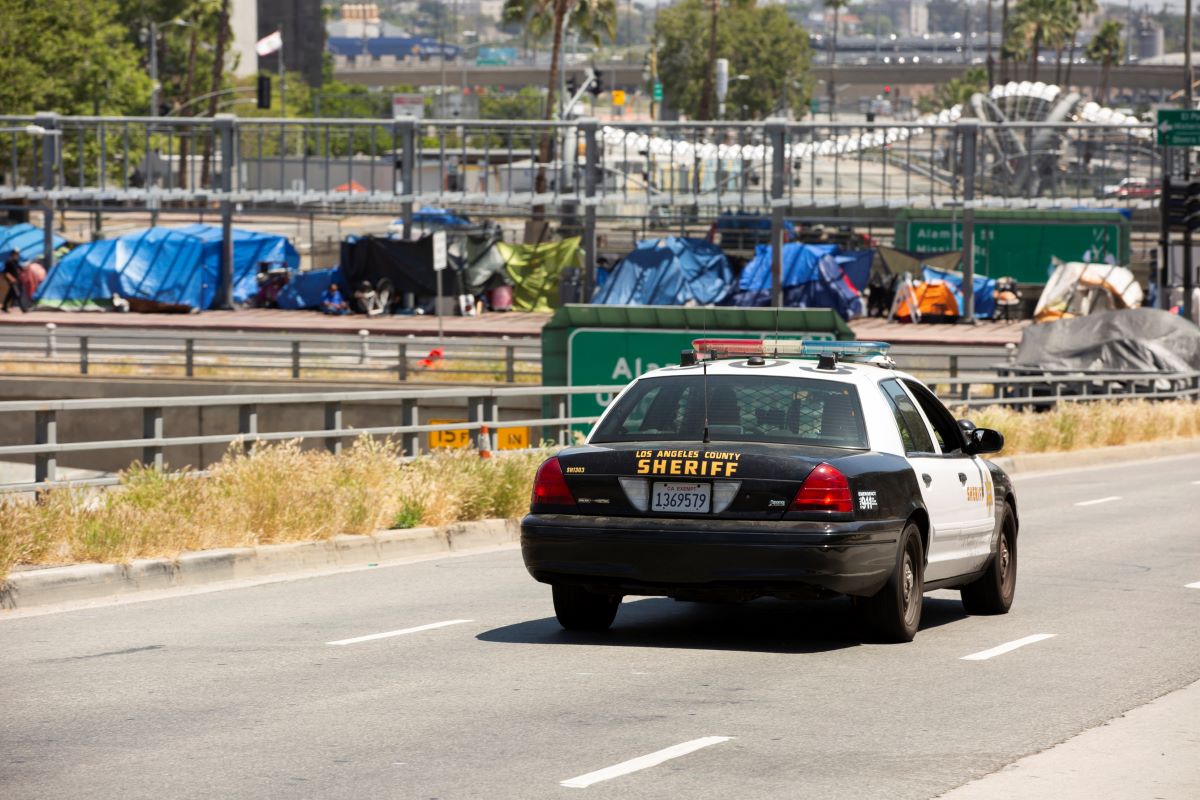Criminalization Is Not the Answer. We Cannot Imprison Our Way Out of a Housing Crisis
On February 1, 2023, Arizona-based Republican Senator Justine Wadsack of the 17th District introduced bill SB 1413 to the Senate.
The bill operated under the title “homeless encampment; removal” was symbolic of typical anti-homeless legislation. It read like a page from a dystopian manifesto, calling upon the elite class to further punish poor people by confiscating their tents, trashing their belongings, and forcefully evicting them from wherever they set up their makeshift living quarters.
To put it plainly, if passed, SB 1413 would have commanded all of the following:
- Required Arizona cities, towns, and counties to immediately remove homeless encampments as soon as they are reported, giving encampment residents just 24 hours to vacate the premises or risk losing all of their personal belongings
- Charge homeless encampment residents with criminal trespassing in the first, second, or even third degree, the latter of which constitutes a class 6 or class 5 felony
- Dispose of all displaced homeless encampment residents’ personal property if it is not claimed within 14 days of the eviction
You read that right.
If you think it is abhorrent that a piece of legislation demanding the forced removal, imprisonment, and displacement of people and their personal property would be presented to the Senate, picture this:
Hundreds more bills sit in the docket that are practically carbon copies. Many of them have already been passed. SB 1413 would have joined the ranks of recently passed anti-homeless legislation had it not been vetoed by Arizona Governor Katie Hobbs. On June 5, 2023, Governor Hobbs wrote a short memo in response, stating:
“People become and remain unsheltered for a variety of reasons. The legislation addresses none of those root causes, offers no pathways to assistance, and effectively criminalizes experiencing homelessness.”
While brief, this quote succinctly describes the very problem anti-homeless legislation presents. Not only is the tactic ineffective, expensive, and cruel, but it also offers no actionable solutions to the problem it pretends to solve.
With a shortage of more than 7 million affordable homes and growing, the truth is clear: we, as a nation, cannot imprison our way out of a housing crisis.
This is a proven failed approach recently criticized by the United Nations, seemingly to no avail.
Other countries watch in wonder as everyday American workers buckle under extreme rent burden, eventually setting up makeshift shelters that sit cattycorner to the surplus of vacant luxury apartments dotting the landscape. Meanwhile, the legislative wheels just keep spinning in circles, a monotonous cycle that has no end.
New Bills That Criminalize Homelessness Are Constantly Being Proposed
“There are bills being proposed almost every day that would criminalize homelessness in many small towns, larger cities, and, most concerningly, at the state level,” explained Eric Tars, the National Homelessness Law Center’s Senior Policy Director.
While this criminalization strategy has been implemented ineffectively for centuries, Director Tars pointed out that there is now a legislative blueprint.
This is terrible news when you consider that, according to the Center for Public Integrity, more than 10,000 proposed bills were introduced over eight years that were practically replicas of one another. Of those bills, 2,100 were passed into law.
This tactic is sometimes referred to as “model legislation.”
If anti-homeless laws begin being drafted through model legislation, this could equate to thousands more laws penalizing homeless people for merely surviving on the streets.
“We used to see that the criminalization of homelessness kind of was organically popping up in city after city, but it wasn’t like there was an active pro-criminalization lobby pushing these policies,” Tars said. “However, over the past three to five years, we have seen the emergence of an extremely well-funded pro-criminalization lobby emerging, and actively promoting bills at the state level. This is being led by an organization called the Cicero Institute.”
“The conservative think tank has a piece of template legislation that they have gotten introduced in about a dozen states,” Tars continued elaborating on the severity of the situation. “Those bills would ban camping statewide, redirect any funding from permanent housing solutions to legalized encampments, ‘safe’ parking lots, and other temporary measures.”
“It really shows that they’re just trying to present the most bare-bones, minimum conditions that they can get away with and not allow people who are forced to reside in those encampments to complain about the abhorrent conditions,” Tars said. “The bills also make it easier for homeless persons with mental health disabilities to be involuntarily committed, using civil procedures.”
These Template Bills Are Deceptively Titled and Can be Difficult to Spot
An age-old expression states that the devil will never walk right up to you and tell you he has bad intentions. Instead, he will introduce himself as a trusted friend, donning a mask of false comradery, only revealing his true colors when it’s too late.
Likewise, bills that are bent on criminalizing homelessness are often given misleading titles, like the notorious “Reducing Street Homelessness Act,” which does not reduce street homelessness so much as it fills the prisons up with individuals who can’t afford houses and then spits them back out worse off than before, effectively creating a homeless cycle, or a homeless industrial complex if you will.
Since the “Reducing Street Homelessness Act” passed in 2022, other bills with template criminalization text have also been introduced. Here are some of their acting titles:
- Missouri House Bill 2614 titled “Creates Provision to Reduce Homelessness” – Status: died in the chamber
- Missouri SB 1106 titled “Modifies revisions relating to funding for housing programs” — Status: passed. Effective January 1, 2023, all homeless funding is mandated to be used for short-term “solutions,” including state-sanctioned encampments, “safe” parking areas, and short-term shelters
- Senate Bill 1560 titled “Municipalities; prohibiting use of land for certain activities; describing elements of offense; allowing peace officers to issue citation after certain efforts.” – Status: died in Committee. Please note how police officers are subtly referred to as “peace officers” while being encouraged to issue citations to people enduring homelessness
Be on the Lookout for Bills that Propose Involuntary Displacement, Imprisonment, or Commitment to Mental Health Institutions
“That’s also something that we see on the rise right now across the country,” Director Tars added. “Bills like the CARE Court in California. In some instances, instead of using the criminal legal system to sweep people off the streets, these politicians use the civil involuntary commitment system to basically the same effect, to be able to disappear people, essentially from the streets, and place them in detention settings, whether it’s jail or an involuntary commitment in a mental health institution.”
Talk to Your Legislators About Hateful Anti-Homeless Legislation
As of late, there are already hundreds of pieces of anti-homeless legislation on the books. But that doesn’t mean they have to stay there. With the UN calling the US out on criminalizing homelessness, all you have to do is add your voice to the crowd, speaking a small but impactful truth to power to make a difference. Talk to your legislators about eliminating anti-homeless legislation and replacing it with laws that make housing a human right for all.












